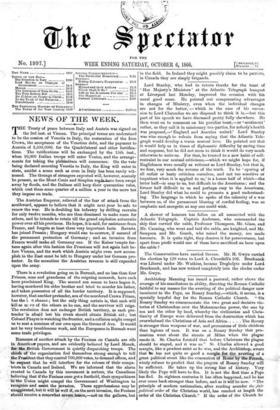Lord Stanley, who had to return thanks for the toast
of ' Her Majesty's Ministers' at the Atlantic Telegraph banquet at Liverpool last Monday, improved the occasion with his usual good sense. He pointed out compensating advantages in changes of Ministry, even when the individual changes are not for the better, — which in the case of his succes- sion to Lord Clarendon we are disposed to think it is,—but this part of his speech we have discussed pretty fully elsewhere. He then went on to comment on his peculiar toast,—or ' sentiment' rather, as they call it in missionary tea-parties, for nobody's health was proposed,—' England and America united.' Lord Stanley was wise enough to refrain from saying that the Atlantic Tele- graph would develop a warm mutual love. He pointed out that it would help us in times of diplomatic difficulty by saving time and suspense, but he did not seem to think it would do very much otherwise to unite us. For that, he trusted to a new habit of self- restraint in our mutual criticisms,—which we might hope for, if Englishmen were usually as reticent as Lord Stanley, but that is, we fear, very much the reverse of the truth. To be ' sparing of all unfair or hasty criticism ourselves, and not too sensitive or impatient when it is applied to us,' is a lesson half of which—the latter half—is easy to us, but difficult to the Americans ; and the former half difficult to us and perhaps easy to the Americans. Lord Stanley did what he could to promote a good understand- ing. The language in which he spoke of the calamity of a war between us, of the paramount blessing of cordial feeling, was as emphatic and energetic as any one could wish.






























